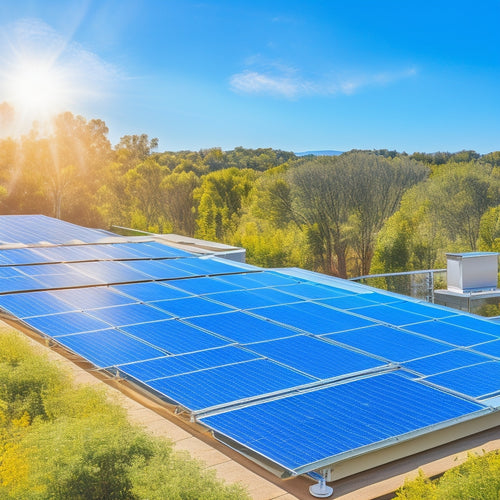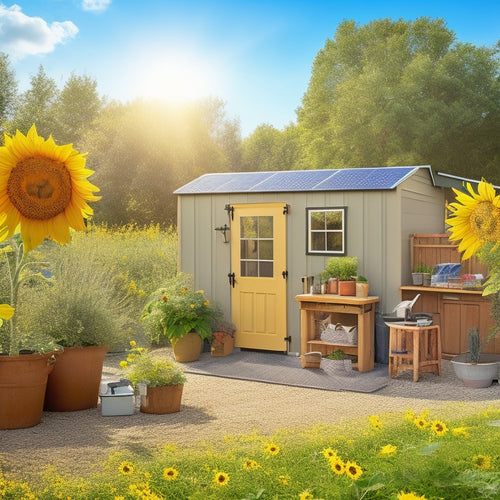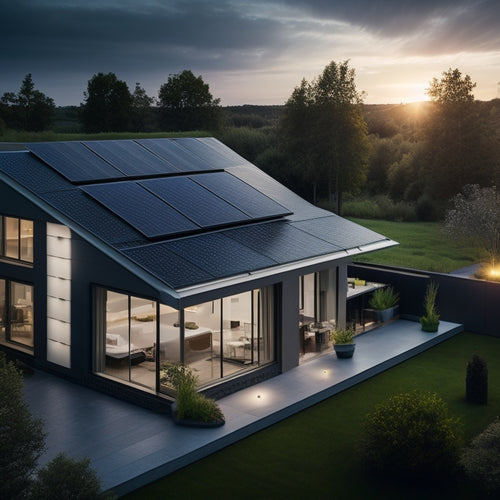
Cut Costs With Affordable Home Power Solutions
Share
You're taking control of your energy bills, and that's a smart move, because with the right affordable home power solutions, you can cut costs greatly and start saving money today. By utilizing solar power, you can reduce your energy bills and even increase your property value. With affordable solar panel options and energy-efficient upgrades, you can maximize your savings. Simple strategies like energy audits, smart thermostats, and LED lighting can rapidly reduce your energy bills. As you investigate these options, you'll find more ways to optimize your energy usage and achieve even greater cost savings.
Key Takeaways
- Solar power can significantly reduce energy bills for homeowners, with costs decreasing over the years and financing options available.
- Conducting energy audits and implementing energy-efficient upgrades can identify and fix inefficiencies, leading to faster returns on investment.
- Simple strategies like using smart thermostats, LED lighting, and weatherstripping can rapidly reduce energy bills with minimal upfront costs.
- Renewable energy sources like wind, geothermal, and hydro energy offer unique applications for sustainable energy generation and cost savings.
- Smart home systems and standby power management can enhance energy management, provide insights into consumption patterns, and promote energy-saving habits.
Solar Power for Home Savings
As you consider alternative energy sources to reduce your reliance on the grid, solar power emerges as a viable option for home savings.
Solar power offers a clean, renewable energy source that can considerably cut your energy bills. Additionally, you can take advantage of solar incentives, such as tax credits and rebates, to offset the initial installation costs.
With proper energy literacy, you can steer through the complex renewable energy environment and make informed decisions about your energy needs.
If you're unable to install solar panels on your property, community solar programs provide an alternative solution. These programs allow you to invest in a shared solar array, providing you with a proportionate amount of electricity.
Affordable Solar Panel Options
You're likely contemplating solar panels as a viable option for your home, but you're probably wondering about the costs.
The good news is that solar panel costs have decreased considerably over the years, making them a more affordable option.
Economies of scale and production efficiency mass production have led to lower costs per unit, allowing manufacturers to split fixed costs and reduce overall production costs.
As you investigate your options, you'll also want to evaluate the energy efficiency gains you can achieve with the right solar panel system.
Solar Panel Costs
Switching to renewable energy sources like solar power can be an intimidating task, especially when considering the upfront costs. However, with affordable solar panel options, you can reduce your reliance on traditional energy sources without breaking the bank.
You can investigate solar panel financing options, such as loans or power purchase agreements, to spread the cost over time. Additionally, government incentives like the Solar Investment Tax Credit can help offset the initial investment.
For instance, you can claim a tax credit of up to 26% of the total cost of your solar panel system. By taking advantage of these affordable options, you can start generating clean energy and reducing your energy bills sooner than you think.
Energy Efficiency Gains
Your solar panel system's energy efficiency gains are a significant advantage of investing in affordable solar panel options. By reducing your energy consumption, you'll maximize the benefits of your solar panel system.
Start by conducting energy audits to identify areas of inefficiency in your home. This will help you pinpoint opportunities for improvement, such as insulation upgrades or sealing air leaks.
By addressing these issues, you'll reduce your energy needs and make the most of the energy generated by your solar panels. This means you'll enjoy greater savings on your utility bills and a faster return on your investment in solar energy.
Cutting Energy Bills Fast
By implementing a few simple strategies, homeowners can rapidly slash their energy bills, freeing up more money in their budgets for the things that matter most. Conducting an energy audit helps identify areas of inefficiency, while installing smart thermostats optimizes heating and cooling usage.
| Strategy | Cost | Annual Savings |
|---|---|---|
| Energy Audit | $300-$500 | $500-$700 |
| Smart Thermostat | $200-$300 | $150-$250 |
| LED Lighting | $50-$100 | $100-$150 |
| Weatherstripping | $20-$50 | $50-$100 |
| Power Strip | $10-$20 | $50-$100 |
These simple changes can add up to significant savings over time, making them a great starting point for cutting energy bills fast.
Benefits of Renewable Energy
You're likely considering renewable energy sources because you want to reduce your reliance on fossil fuels and lower your energy bills.
By utilizing green energy sources like solar or wind power, you'll not only decrease your carbon footprint but also enjoy energy independence now.
With renewable energy, you'll reduce your impact on the environment while gaining control over your energy costs.
Furthermore, solar power systems provide Energy Independence and Autonomy by breaking free from grid reliance, and can even increase your property value by up to $15,000.
Green Energy Sources
What role does renewable energy play in reducing our reliance on fossil fuels? As you investigate affordable home power solutions, it is vital to understand the benefits of green energy sources. Renewable energy is an important component in the shift to a more sustainable future.
| Energy Source | Advantages | Applications |
|---|---|---|
| Wind Energy | Zero emissions, low operating costs | Electricity generation, water pumping |
| Geothermal Heating | High efficiency, reliable | Space heating, water heating, cooling |
| Solar Energy | Abundant resource, low maintenance | Electricity generation, water heating |
| Hydro Energy | High energy conversion, low emissions | Electricity generation, irrigation |
Lower Carbon Footprint
How can you make a notable impact on the environment while powering your home? By adopting renewable energy sources, you can greatly reduce your carbon footprint.
Renewable energy is a clean and sustainable way to power your home, reducing your reliance on fossil fuels and lowering greenhouse gas emissions. This means you'll be contributing less to climate change and air pollution.
By choosing sustainable living and eco-friendly practices, you'll not only be helping the environment, but you'll also be saving money on your energy bills.
Renewable energy is an essential step towards a cleaner, greener future, and it's more accessible than ever.
Energy Independence Now
Freedom from reliance on the grid is a tantalizing prospect, and one that's now within reach thanks to renewable energy. You can achieve energy autonomy, where you generate and manage your own power, reducing your reliance on the grid and lowering your energy bills. This shift towards sustainable living not only benefits the environment but also provides a sense of security and independence.
| Renewable Energy Source | Benefits | Cost Savings |
|---|---|---|
| Solar Power | Zero emissions, abundant resource | 50-75% reduction in energy bills |
| Wind Power | Low operating costs, scalable | 25-50% reduction in energy bills |
| Geothermal Energy | High efficiency, reliable | 75-90% reduction in energy bills |
| Hydro Power | Renewable, low maintenance | 50-75% reduction in energy bills |
| Biomass Energy | Carbon neutral, waste reduction | 25-50% reduction in energy bills |
Solar Panel Installation Tips
Typically, solar panel installation projects involve intricate planning and execution to guarantee ideal energy collection and system longevity.
You'll want to confirm your installation process is done correctly to avoid future headaches. During the installation process, consider the direction and angle of your solar panels to maximize energy production.
Also, make certain to leave enough space between panels for easy solar panel maintenance, such as cleaning and repairs.
Additionally, choose a reputable installer who can assess your roof's condition and provide a durable, watertight seal.
Maximizing Home Energy Efficiency
Your home's energy efficiency plays a significant role in reducing your reliance on the grid and lowering your energy bills. By optimizing your home's energy usage, you can cut costs and minimize your environmental impact.
Start by conducting an energy audit to identify areas of inefficiency. This will help you pinpoint opportunities for improvement, such as sealing air leaks, upgrading insulation, and installing energy-efficient appliances.
Consider investing in a smart home system, which can help you monitor and control your energy usage in real-time. Additionally, look for ways to reduce standby power consumption, such as unplugging electronics when not in use.
Frequently Asked Questions
Can I Install Solar Panels on My Own?
Go ahead, try installing those solar panels yourself - it's not like you'll void the warranty or electrocute yourself. But seriously, unless you're an electrician, DIY installation and future solar panel maintenance will be a recipe for disaster, so don't.
Do Solar Panels Work During Power Outages?
You'll find that solar panels alone don't provide power during outages, as they're grid-tied for safety reasons. However, with energy storage options like batteries, you can enjoy backup power and continued solar panel functionality when the grid goes down.
Are Solar Panels Covered by Homeowners Insurance?
You'll be relieved to know that your solar panels are typically covered by your homeowners insurance, which often includes coverage for damage, theft, and other losses, in addition to the manufacturer's solar panel warranties.
Can I Sell Excess Energy Back to the Grid?
You generate excess energy, and now you're wondering if you can sell it back to the grid. Yes, with a grid connection, you can participate in energy buyback programs, feeding surplus power into the grid and offsetting your utility bills.
How Long Do Solar Panels Typically Last?
You'll be pleased to know that solar panels typically last around 25-30 years, with some lasting up to 40. Proper maintenance, like cleaning and inspecting, helps extend their lifespan, ensuring peak energy production and minimizing potential issues.
Related Posts
-

What Types of Solar Energy Devices Are Available
You'll find several types of solar energy devices available today, each customized to different energy needs. Photovo...
-

Building an Emergency Backup Solar Power System in 5 Essential Steps
Building an emergency backup solar power system involves five key steps. First, assess your daily energy needs to ide...
-

Home Solar Battery
You're opting for a home solar battery that allows you to utilize the power of the sun during the day and use it at n...


